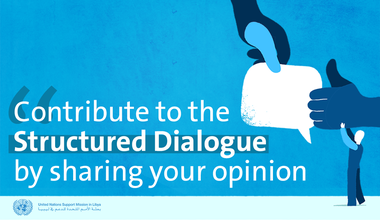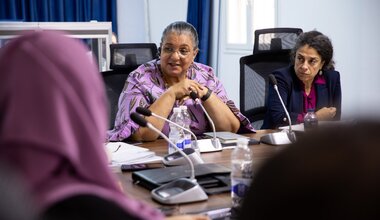Statement of SRSG Martin Kobler to the Ninth Ministerial Meeting of Libya’s Neighbouring Countries
Niamey, Niger,
“A united neighbourhood for a strong Libya”
Your Excellency, Minister Ibrahim Yacouba,
Excellencies,
Colleagues,
Ladies and Gentlemen,
It is an honour to be here today to address you in this important forum.
I am pleased to see that Libya is represented today by Mousa Al-Koni.
I would like to begin by thanking our hosts for continuing what is now a key forum for strengthening and harmonizing regional engagement in support of Libya.
Regional powers have an important role in Libya and it is vital that Libya’s neighbours have a common and coordinated approach.
Excellencies,
Since we last met in Tunisia, the situation in Libya has become increasingly delicate.
I am very worried about the situation in Tripoli.
Last Friday, members of the former government in Tripoli took over the over the premises of the High Council of State.
I condemned this action. Attempts to create parallel institutions and obstruct the implementation of the Libyan Political Agreement will generate further disorder and insecurity.
This standoff should not escalate into violence. It has to end peacefully.
The ability of the Presidency Council to extend control and govern the country has been complicated by a number of factors.
Firstly, the lack of willingness from the House of Representatives to vote on the Government of National Accord has furthered divisions within the country. The House of Representatives has voted against the GNA after 6 months and 8 days.
Secondly, there continues to be a lack of progress in the implementation of the Libyan security architecture as envisaged by the Libyan Political Agreement.
Instead, too many Libyan security actors continue to operate with autonomy leading to insecurity and an inability to create the rule of law.
The inability to form a common leadership and consolidate these forces into a unified structure creates the conditions for further conflict.
Thirdly, challenges faced by the Presidency Council in establishing an effective system of governance have resulted in a decrease in basic services. These shortcomings are compounded by the worsening economic situation.
Daily life for Libyans is becoming more difficult. With oil production well below its potential, inflation of the Libyan Dinar is at nearly 20%, food prices are increasing and the lack of liquidity mean that cash is becoming scarce.
I urge the Presidency Council and the Central Bank to address these issues and ensure that Libyan resources are utilised effectively for the benefit of the Libyan people.
There are three main problems that have to be addressed as a matter of urgency – the fight against terrorism, illegal migration and organized crime. Without a unified and effective Libyan government there will be continued insecurity which can be exploited by Da’esh and other extremist groups.
Militias continue to cross borders along with weapons. Traffickers will also use the security gaps to bring migrants the hazardous journey in the hope of reaching Europe.
Last week, I again visited a detention centre for migrants and saw the abominable and unacceptable circumstances in which they were kept.
Everything is lacking: water, hygiene, and even air.
The only things that we can find in abundance are diseases and despair.
Libya is certainly not a country where migrants can return safely.
I congratulate the European Union for their initiative to train the coast guard. It is however not enough. It is imperative to immediately address three urgent questions:
- One, the humanitarian situation of the detention centres
- Two, the financing of repatriations facilitated by IOM and
- Three, working with the countries of origin to address the root causes of migration.
Despite these concerning trends, there is hope. Libyans have and continue to show resolve to improve their situation. From Sirte to Benghazi, progress is being made against the fight against terrorism. Da’esh, which only months ago was expanding its territory, is now a shadow of what it once was.
Your Excellencies,
In Libya, there can be no military solution. The Libyan Political Agreement is the only framework. There is no alternative.
Even critics of the Libyan Political Agreement believe that it is the only framework through which to achieve a political solution.
The Presidency Council is now again in the process of creating a new Government of National Accord. This provides a new opportunity to address the concerns of the different Libyan stakeholders and create consensus on the way forward
Although achieving consensus will not be easy, I am firmly supportive of the efforts of the Presidency Council to arrive at a decision.
When they do arrive at a decision, it will be incumbent on the House of Representatives to exercise its responsibility to meet with a full quorum and endorse the proposed government. This is an opportunity that cannot be missed.
Excellencies,
Libya is at a critical stage. These next few weeks will show whether Libyans are able to chart a way together towards peace, or risk slipping into renewed conflict. Either we move together united or we fall divided.
To avoid a resumption of conflict in Libya, I want to emphasize the following three points.
Firstly, while Libyans bear the primary responsibility in determining their fate, regional powers play an important role in the country’s future.
To this end, I want to encourage you to support the newly unified Presidency Council in its efforts to create a new Government of National Accord.
I encourage you to urge the House of Representatives to endorse the new government once it is presented.
Secondly, while I recognize that the Presidency Council has yet to unify its security institutions, it is imperative that international interaction with Libyan security actors remain within the framework of the LPA, in accordance with United Nations Security Council resolutions.
I would also like to encourage Libya’s neighbours to impress upon Libyan stakeholders the need to unify Libyan security actors under the Presidency Council.
Thirdly, I would like to recognize the challenges that exist in improving border security in Libya. Ensuring secure borders is a priority for any country.
I am encouraged by the inter-state cooperation that I see between Libya’s neighbours in improving border security. Exchanging information, joint border control, and joint training and exercises are all steps in the right direction.
I would like to express support for these efforts and more particularly with regards to working with border communities to ensure that they are assisting in security efforts; in creating regionally compatible criminal databases and improving border security infrastructure. The international community stands ready to assist.
Improving border security is vital to address challenges related to irregular migration as well as to stem the flow of illegal weapons.
Despite the weapons embargo there are an estimated 26 million weapons in Libya. These weapons do not fall from the sky, they come from land and by sea. I urge all member states to abide by the arms embargo and to control their borders respectively.
On this final point, I would like to highlight that next week, starting on 24 October, is International Disarmament Week.
The tools for stopping the proliferation of illegally held weapons are there, we must ensure that they are respected and given the support needed to ensure their implementation.
Excellencies,
Ladies and Gentlemen,
Libya is not, as I often hear, at a crossroads.
Libya has found its way, and this way is the Libyan Political Agreement.
The path is long and arduous, but the goal is clear, and the roadmap has been drawn.
However the way is till full of pitfalls and the risk of the resurgence of the conflict is real.
The Libyan Political Agreement remains the framework for a solution. I encourage all of you to unify behind a common approach. One that will bring the Libyan parties together and set the country on the path to stability and progress.
Thank you.
 United Nations Peacekeeping
United Nations Peacekeeping UN
UN








